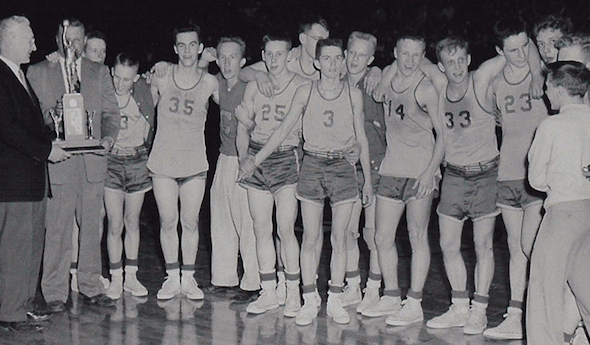
60 Years Later, Chassell Streak Stands
March 22, 2016
Sixty years ago, something happened in Michigan high school boys basketball that hadn’t happened before and hasn’t happened since – three Upper Peninsula teams won titles. Stephenson beat Detroit St. Andrew, 73-71 in overtime when “Marvelous” Mel Peterson made the first basket of sudden death; Crystal Falls (before it was called Forest Park) beat Berrien Springs, 71-69, in Class C; and Chassell won the first of three straight Class D titles, beating Portland St. Patrick, 71-68, by rallying from a 15-point deficit with less than four minutes to play.
The win was part of Chassell’s state record 65-game winning streak, which still stands. Below is an excerpt of a piece on the Chassell streak written before the teams were honored as part of the “Legends of the Games” program at the 1998 Boys Basketball Finals.
The old adage in sports states that records are made to be broken. The longer, however, the record stands, the more legendary the accomplishment becomes.
Chassell's wins were the centerpiece of Upper Peninsula success in the MHSAA Boys Basketball Tournament during the first 11 years after the format unified the two peninsulas. From 1932 to 1947, separate finals were conducted in both peninsulas. Between 1948 and 1958, Upper Peninsula schools won three Class B crowns (there were no Class A schools in the U.P. at the time), two Class C titles, and seven Class D championships – over one-third of the available first-place finishes.
Wrote the Marquette Mining Journal in 1956, the year that Stephenson in Class B, Crystal Falls in Class C and Chassell in Class D all won MHSAA titles, "All of these is a startling figure since in the period the U.P. has only 42 (schools) -- one eighth of all the lower class quarterfinalists.
"Under the law of averages, the U.P. should come up with one state champ every three years."
It looked at first that the law of averages would catch up with Chassell. After starting the 1955-56 season with 11 straight wins, the Panthers lost a close January game at Trout Creek, and then won their way downstate into the finals against Portland St. Patrick. In that final game, St. Patrick held a 15-point lead at 68-53 with less than four minutes to play.
Coach Ed Helakoski, the architect of the Chassell winning streak, called time out and told his team to apply full court pressure, a rarity at the high school level at that time.
Playing without standouts Terry Pokela and Tom Peters, who had fouled out, Chassell scored the final 18 points of the contest, the biggest game-ending rally in Finals history, and won the first crown, 71-68. Sophomore guard Don Mattson scored the winning points with only seconds to play, finished the game with a finals record 25 points, and the Panthers finished the season 25-1 with 14 consecutive victories.
During the 25-0 run to the crown in 1956-57, the only close games were regular-season wins against National Mine (71-66), L'Anse (64-63), Doelle (73-69), and a 58-50 decision over Stevensville in the championship game at Jenison Fieldhouse. Of the other 21 games, none were closer than 13 points, and the average margin of victory was 27 points.
The winning streak stood at 39 entering the 1957-58 season, and the 10-year state record of 59 consecutive victories by Mass from 1947-49 was within reach. However, Mattson was the only returning starter from the back-to-back championship teams, and perhaps Helakoski's greatest coaching job lay ahead to replace four starters in a school which had just over 30 boys enrolled in grades 9-12.
Doelle, which had given the Panthers one of its closest games the season before, was leading, 62-60, in an early-season contest. As time ran out, Bob Belhummer of Chassell was fouled at midcourt and sent to the free throw line with a one-and-one opportunity. Belhummer sank both shots to force the only overtime game of the streak, a 72-66 victory.
The new state record of 60 consecutive victories came in a 45-43 decision over Marenisco in the MHSAA District championship game. A trip over the newly-constructed Mackinaw Bridge came two weeks later and the Panthers became the first school to bring an MHSAA trophy across the structure when the 65th victory was recorded, a 66-61 decision over Owosso St. Paul. Mattson tallied 27 points in the finale to set another championship game record.
In the 40 years since Chassell's incredible feat, only twice has the winning streak been threatened. Flint Northwestern racked up 60 victories between January of 1984 and February of 1986; and Saginaw Buena Vista had a streak reach 55 games between December of 1991 and December of 1993.
In many communities, success streaks come and go, but a constant ideal of school sports then and today was captured by John Pyykkonen, a guard and forward on the 1956 and 1957 teams who summarized the events: "I remember the friendly competition amongst the members of the team and how well we worked together and how our parents, fans and the community were behind us 100 percent of the way. One of the greatest highlights in a young man's life and will never be forgotten."
Records were made to be broken. But legends, especially Legends of the Games like Chassell, endure the test of time.
GLORY DAYS ... Remembering The Streak
John Pyykkonen - 1956-57 Guard-Forward: "One thing I remember clearly, besides the games, is walking into Jenison Fieldhouse and being totally awestruck by the raised floor and the huge (in my eyes) guides who showed us around the building. I recall the game in 1956 when we were so far behind in points and we were able to overcome the point deficit by a full court press. The huge crowd gathered there were all cheering for the small-town team."
Robert Belhumer - 1956-1957-1958 Guard: "We had a great camaraderie among the members of our team. Also Chassell is a small town in the Upper Peninsula and the fans were there rooting for us during our seasonal games and were there for us at the championship games in Lansing."
Donald Jaakkola - 1956 Guard (On the championship game): "We ran out onto the court to a crowd of 12,000 people, most of whom were cheering for Portland St. Patrick. Needless to say, we felt a bit in awe as we came from Chassell, a small town in the Upper Peninsula.
"We were down 15 points with four minutes to go and two of our tallest players had fouled out earlier. Coach Ed Helakoski called a timeout and the basketball gods were with us. We threw a full court press defense and scored 18 points while holding St. Patrick scoreless. It gave us a screaming 71 to 68 victory. The crowd of 12,000 was now cheering for us."
Mike Wisti - 1956 Guard (On Coach Ed Helakoski): “I am quite sure there are many who will remember Ed Helakoski as a good coach. I'm sure he was a good coach; he had a knack for demanding discipline and teamwork, while not stifling the creativity of his players. However, I believe he should also be remembered as a great classroom teacher. He taught Government one year and Sociology the next and was the best classroom teacher that I had in high school. His ability to make Government interesting and explain how everything was designed to work is probably one of the biggest reasons for my lifelong interest in government and politics."
Kenneth Tormala - 1956-1957-1958 Forward: "The first year we surprised a lot of teams and people by winning the state championship. The second year we were picked to win when the year started and it would have been a real disappointment not to have done so. The third year was a real challenge since we lost so many players, but we had the backbone of the team, Don Mattson, who was an all-stater. This team was the most closely knit of all. We had a lot of very close games and had to dig down to everything we had learned to win many of them. A very satisfying year and we kept the winning streak going, to the surprise of many, including the previous teams.
"These memories will be fondly remembered until we die. Thank you to the late Mr. Helakoski."
James Komula, 1958 Guard (On what stands out from that season): "Being from a small town and playing in small gyms, the spaciousness and large crowd in Jenison Fieldhouse proved very exciting. Also, the reception and festivities upon our triumphant return to Chassell will forever be a highlight of personal memories. People were waiting in their vehicles nearly 30 miles from town to accompany our motorcade home.
"Although I didn't give it much thought, the experience and influence of playing on that team would set the direction for my career. Upon graduation from Michigan Tech, I was given an interim position to teach and coach at L'Anse High School. In 1966, I was assistant coach when L'Anse won the Class C state championship. After that I moved to Livonia, where in later years I was head coach at Bentley High School. Although I never intended, my high school basketball did influence my career to work with youngsters, and help them share in the rewards of the commitment and lifelong learning of athletics."
Terry Pokela, 1956-1957 Center: "We truly had a team. Coach Helakoski did not allow us to think of individual statistics or anything like that. He constantly emphasized the team concept. It certainly paid off.
"Also, we were one of the first teams to fast break after every missed shot by opponents. Our three-lane break broke many team's backs, as they couldn't keep up with us. Coach Helakoski emphasized rebounding position to enable the fast break to get started. We could also shoot field goals from any part of the court. Don Mattson would have scored 40 points a game if the three-point field goal would have been in effect."

We Will Always Remember Trojans, Lumberjacks as 114-Year-Old Rivalry Nears End
By
Ron Pesch
MHSAA historian
February 9, 2024
The MHSAA basketball record book still lacks a rivalries category. The state’s football record book offers clues to likely candidates, but without deep research, the participants and sequencing of such lists will remain unknown.
Certainly, among the candidates would be the annual boys basketball battles between Saginaw’s east side and west side – Saginaw High vs. Saginaw Arthur Hill. Come Friday, Feb. 16th, 2024, twilight falls on one of Michigan’s most intense. Because of its significance, the game will be hosted outside of a high school gymnasium.
Saginaw’s Dow Event Center will stage the final regular-season showdown between the Trojans and Lumberjacks. Titled the ‘Game of Legends,’ all 5,000 tickets for the celebration were snapped up in 20 minutes. After years of discussions, at the end of the school year, Saginaw High and Arthur Hill will combine to finalize the formation of Saginaw United High School.
Based on the research of Dave Slaggert, the series between schools began during the 1910-11 season at the Saginaw Manual Training School gymnasium. Head varsity boys basketball coach at Arthur Hill from 1996 through 2001, Slaggert spent five years compiling a book documenting the rivalry. Much of the manuscript has already been committed to paper. That includes a chapter penned by Michigan State University coaching legend Tom Izzo, who highlights the uniqueness of the crosstown rivalry, the crazy fans, and the talent that brought him regularly to town. Titled “Remember the Trojans & the Lumberjacks,” the concluding chapter awaits the results of the 2024 season.
The Beginnings
In 1889, Michigan’s State Legislature consolidated the cities of East Saginaw and Saginaw City into what we know today as Saginaw.
East Side High School opened in 1865. In 1901, West Side High School was renamed Arthur Hill, in honor of a former school board president and mayor of Saginaw City.
Football teams from Saginaw High (sometimes called Saginaw Eastern) and Arthur Hill High first met on the gridiron in 1894. In 1904, both joined Flint (Central) and two schools from Bay City to form the Saginaw Valley League. During the 1910-11 season, the boys squads from the Saginaw schools squared off on the basketball court for the first time.
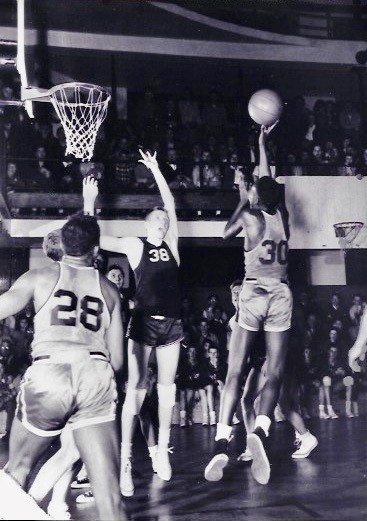 “Saginaw High easily defeated the Arthur Hill High school basketball players … in the first game of the interscholastic series,” stated the Saginaw Daily News, “the final score standing 60 to 17. … (Bill) Steckert contributed 12 field baskets for the winners. … (Leo) Vondette starred for the losers.”
“Saginaw High easily defeated the Arthur Hill High school basketball players … in the first game of the interscholastic series,” stated the Saginaw Daily News, “the final score standing 60 to 17. … (Bill) Steckert contributed 12 field baskets for the winners. … (Leo) Vondette starred for the losers.”
Perhaps it was a typo – it’s impossible to know – but the final score differed in the 1911 Saginaw yearbook – “The Aurora” – when published in the spring. “Before a large crowd of enthusiastic fans, Arthur Hill was decisively defeated in the local gym, the final count being 69 to 17, with the East Siders on the heavy end.”
The author concluded with flair and flourish: “Steckert starred for Saginaw, getting 24 points to his credit, while Vondette was the celestial light for the vanquished quintet. Dancing was enjoyed after the game.”
A week later, the Saginaw girls basketball team opened its season against the west siders. According to the yearbook, “Saginaw out-played Arthur Hill and defeated them by the score of 41-4.” The newspaper credited Leona Buck as the leading scorer, with a phenomenal 29 points.
The Inevitable Finale
The doors open at 3 p.m. for the 2024 festivities at The Dow next Friday. Fittingly, the Saginaw girls team will tip off the action on the court at 5 o’clock. The girls programs already have consolidated, and the Phoenix of Saginaw United will face Flint Carman-Ainsworth – a school that consolidated in 1986. The Hill and High contest is scheduled for 7 p.m.
“It’s really going to be a big deal,” said Slaggert, thrilled by the prospect. “Saginaw’s going all out for this. They’re trying to do it up in style.”
The wrap-up comes a decade after what, initially, looked like the end.
On Feb. 15, 2014, Detroit Free Press sportswriter Mick McCabe wrote about the expected unification.
“Saginaw and Saginaw Arthur Hill likely met for the last time ever in the regular season Friday,” he wrote. Saginaw had just knocked off the Lumberjacks, the No. 2 team in McCabe’s weekly ranking of the state’s top teams.
“The Saginaw-Arthur Hill basketball rivalry is the best in the state, so you shouldn’t be surprised when the underdog wins. But Saginaw (11-6) was coming off consecutive losses to Midland and Midland Dow for maybe the first time ever.”
The school district was expected to announce the closure of Saginaw High that following Monday, merging its students into Arthur Hill. The move would mean a new school name, new school colors, and a new nickname.
Like many urban centers across the country, outbound migration of both jobs and people, combined with plunging birth rates, had altered the demographics of cities, and the education landscape.
“In just five decades, the city's population dropped from nearly 100,000 in the 1960s to fewer than 52,000 by the 2010 census,” stated the Saginaw News in 2014. “To say it another way, Saginaw lost 48 percent of its residents during the last 50 years.”
McCabe cut to what that meant to enrollment numbers at the two schools: “In 1987, Saginaw High had over 1,800 students; it is now down to about 600. Arthur Hill had 2,395 students in ’85; it now has 973.”
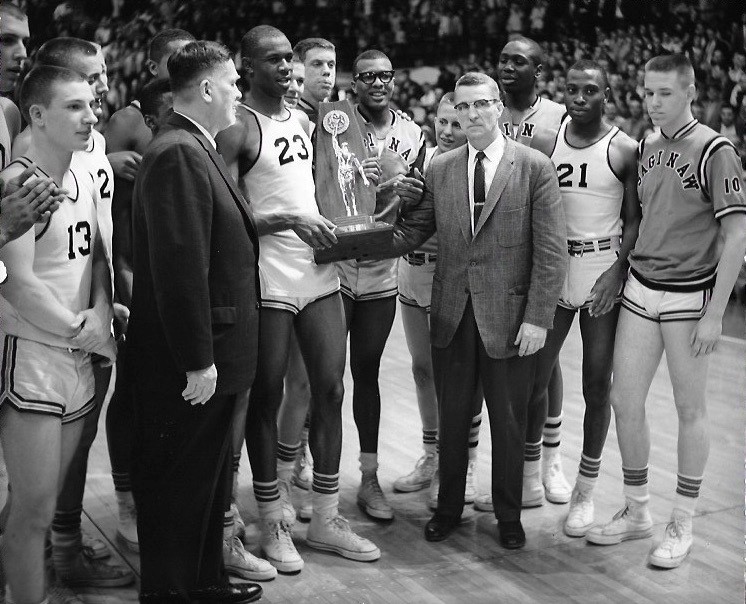 Despite the defeat, McCabe predicted Arthur Hill to be among the final four Class A teams still standing that season when the annual MHSAA Tournament shifted to Michigan State’s Breslin Center. But in the craziness of March, the Trojans again took down Arthur Hill in the Districts, 53-51.
Despite the defeat, McCabe predicted Arthur Hill to be among the final four Class A teams still standing that season when the annual MHSAA Tournament shifted to Michigan State’s Breslin Center. But in the craziness of March, the Trojans again took down Arthur Hill in the Districts, 53-51.
Adding to the madness, the expected consolidation didn’t happen. A recommendation by a Saginaw interim superintendent to close Saginaw High found no school board support.
With the potential consolidation still hovering, one year later sportswriter Bill Khan recalled other recent departures from Michigan’s classic basketball landscape in an article for the StateChamps! Sports Network:
“The Saginaw-Arthur Hill rivalry is at risk of going the way of other great urban rivalries – such as Flint Central-Flint Northern, Pontiac Central-Pontiac Northern, Lapeer East-Lapeer West, Detroit Cooley-Detroit Southwestern, Detroit Mackenzie-Detroit Redford, Detroit Kettering-Detroit Northeastern, Detroit Miller-Detroit Northern and Detroit Southeastern-Detroit Eastern, that have ended in years past due to school closures and consolidations.”
Arthur Hill downed the Trojans twice during the 2014-15 regular season league action, and again in postseason District play, before finishing the year as Class A runner-up, and the holding pattern of the planned school merger continued.
Enrollment numbers continued to drop at both schools and after much community and school board debate, construction on a brand-new five-story Saginaw United High School began in 2022.
A Celebration of Statistics
The state basketball tournament kicked off in 1917. Over 107 years, on only two occasions – in 1943 during World War II, and in 2020, due to COVID-19 – the tournament was not completed.
Slaggert breaks down the City of Saginaw School District’s incredible basketball history in a quick series of numbers.
“47-36-18-8,” said Slaggert, stressing a bullet point of a well-rehearsed pitch, breaking out the incredible success of the two schools come tournament time.
“During those 105 tournaments, 47 times, Saginaw High (starting in 1919) or Arthur Hill (beginning in 1930) made it into the state Quarterfinals – the final eight.
“That’s almost half of the 105 possible years. And in most cases throughout that rivalry, they would have played each other in the Districts. So how many more times would they have made it if they were coming in different brackets or different directions? “
To take that further, he noted, 36 times one of those teams made it into the final four. On 18 occasions, one of the two schools reached the state title game, and on eight occasions, they emerged as MHSAA state champions.
Six of those titles were won by Saginaw High (1942, 1962, 1996, 2007,2008, 2012). Arthur Hill’s championships were won in 1944 and 2006.
“That's a pretty incredible stat for two schools in the same town, don’t you think?” Slaggert asked.
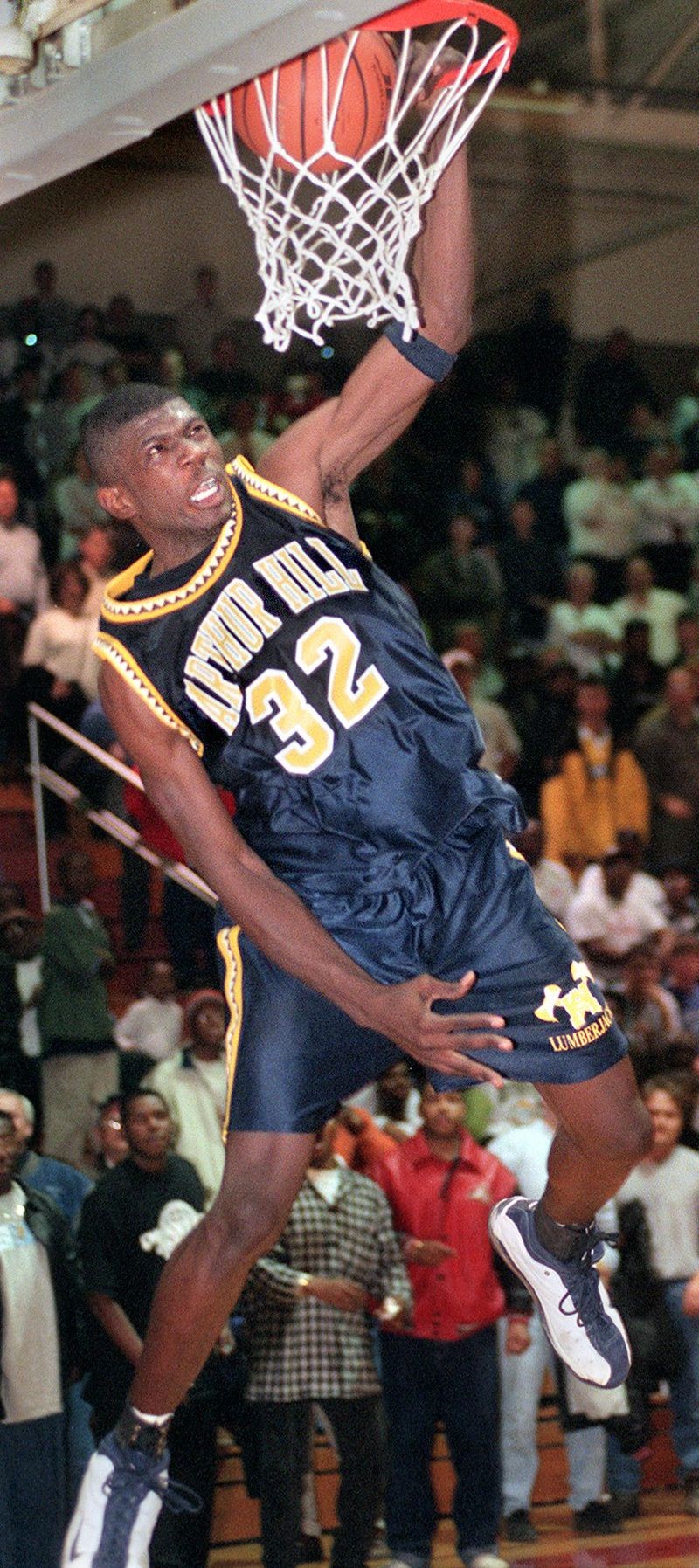 That history also points out another Slaggert challenge. As illustrated, come March the schools could, in theory, bump into each other one more time come the postseason. This year, the teams are in different Districts, and could potentially cross paths in an MHSAA Regional.
That history also points out another Slaggert challenge. As illustrated, come March the schools could, in theory, bump into each other one more time come the postseason. This year, the teams are in different Districts, and could potentially cross paths in an MHSAA Regional.
A Parade of All-Staters
Between 1938 and 2023, a combined total of 106 players from the two schools – 10 or more in each decade from the 1940s to the 2010s – have earned all-state basketball honors from The Associated Press and/or one or more of the Detroit newspapers: the Free Press, News or Times.
Since the introduction of Michigan’s Mr. Basketball award in 1981, honoring the best-of-the-best from the state’s top high school seniors, 10 players from the two schools have landed among the top five in voting: Eric Davis (AH –‘15), Maurice Jones (AH –‘10), Draymond Green (S –‘08), Dar Tucker (AH –‘07), Anthony Roberson (S –‘02), Eugene Seals (S –’00, and head coach of the United girls basketball team), Jason Richardson (AH-‘99), Jessie Drain (S –‘91) and Daryl Reed (S –‘87). Richardson won the award. Davis, Green, Tucker, Roberson, and Seals all finished second in the annual voting.
Tony Smith (S -‘74), Craig Dill (AH -‘63), Ernie Thompson (S -‘62), Webster Kirksey (S -‘51), Dick Rifenburg (AH -‘44), and Larry Savage (S -‘42) were all honored by the Basketball Coaches Association of Michigan with their Retro Mr. Basketball Award when the organization sought to honor the great seniors in Michigan high school basketball from the years 1920 through 1980. Seven others – James Koger (S -‘79), Lovell Humes (S – ’63), Bill Agre (AH -‘47), Gene Glick (AH -’46), Jack Mott (AH -’45), Eddie Johnson (S – ’43) and Stanley Paskiewicz (S -’38) – were among the candidates for that award.
Based on research by Orchard Lake St. Mary’s Robin Goddard, Saginaw High is likely the state’s winningest basketball program, trailed by Benton Harbor, Kalamazoo Central and Orchard Lake St. Mary’s.
Initially, Saginaw dominated the crosstown series with the Lumberjacks. But by the 1920s Arthur Hill overcame the deficit, and by the mid-1950s the Hill had opened a wide 25-game lead in wins versus losses. But by 1975, the gap had narrowed with the Trojans just six games back in the series. And yet, the exact status of the rivalry is still unknown, as the capture of game scores is spotty going forward.
The digging to capture those missing scores continues, as does the race to game day.
Slaggert has committed to printing 1,000 copies of his book. His challenge to date has been selling copies of something that does not yet, physically, exist. As it stands, currently there are 772 pages in the book. It includes a mind-blowing 800+ photos dating as far back as 1905. The sale price is fixed at $40. That currently means the production cost per copy exceeds the retail price, so Slaggert continues to chase sponsorships to defray the printing expense.
“It’s a non-profit effort,” he noted. “If there are any profits, they go to scholarships for the new high school. All money is run through the Saginaw Community Foundation,” which makes sponsorships tax-deductible.
His favorite memory from the series is his last victory as an Arthur Hill coach. It comes from 2001.
“Saginaw High defeated us 90-37 in the second game of that season and finished with a 17-5 season record that year,” he retold. “We had a modest 10-10 season record heading into the Districts but showed lots of improvement through the season. We met again in the District Finals. Saginaw High was led by Anthony Roberson, LaMarr Woodley, Michael Thomas and Tanoris Shepard and was ranked seventh in the state. In front of a sold-out Heritage High School crowd, our kids played their hearts out and, led by Devaundre Whitson, Omar Linder, and Freddy Jackson, pulled out a 68-66 overtime win! (It’s) my greatest thrill in coaching, and most of the old-timers say it’s the greatest upset in the rivalry.”
Slaggert retired from coaching after that season, and in the years to follow, found a desire to record the history of the series.
“I have nine living coaches from Saginaw and Arthur Hill that have written a chapter for me. I have eight others that I've written on Larry Laeding, Chuck Fowler, and different coaches that are deceased,” he said. “My intent is to give something back to my community. I didn’t do this for money. I wanted this story to be passed down to future generations – people 100 years from now about Jason Richardson, Draymond Green, Ernie Thompson, Craig Dill, and all the great ones.
“It’s a labor of love for me, I’ve really enjoyed it.”
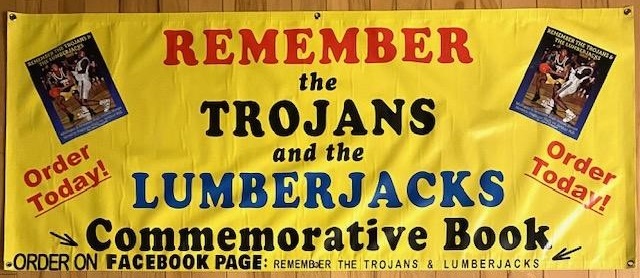 To order Slaggert's book, click for the Facebook link or visit the Saginaw Community Foundation website, click "Give Now" and select the book title as Fund. Cost is $40 with an option including shipping for $52.
To order Slaggert's book, click for the Facebook link or visit the Saginaw Community Foundation website, click "Give Now" and select the book title as Fund. Cost is $40 with an option including shipping for $52.
PHOTOS (Top) Saginaw Eugene Seals drives against Arthur Hill’s Jason Richardson – with coach Marshall Thomas in the background – during a sold-out 1999 game at the Saginaw Civic Center. (2) Arthur Hill’s Ernie Thompson and coach Larry Laeding accept the 1962 Class A championship trophy. (3) Saginaw High’s Webster Kirksey (30) puts up a shot; he graduated in 1951. (4) Richard dunks at the final buzzer as Arthur Hill downs top-ranked Flint Northwestern in a 1999 Class A Regional matchup. (Photos collected by Dave Slaggert. Top photo courtesy of Saginaw News/MLive.)

